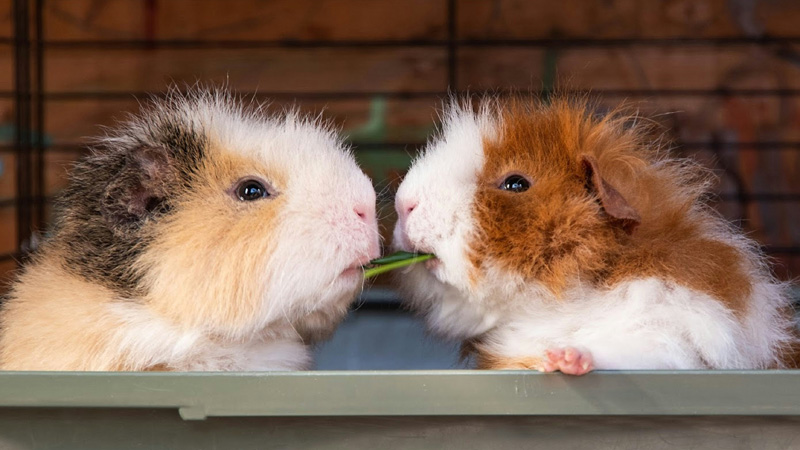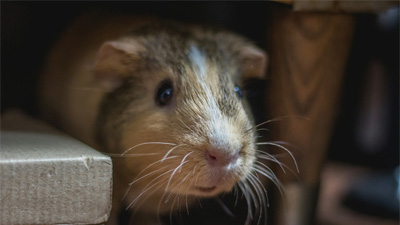Can Guinea Pigs Eat Spinach? (Yes! Small Quantities)

Photo by Pete F on Unsplash
When it comes to providing a healthy and balanced diet for our beloved guinea pigs, it's natural to wonder about introducing new foods. Spinach, with its vibrant green leaves and numerous health benefits, often finds its way into our kitchens. But can guinea pigs enjoy this leafy green too?
In this article, we will explore whether guinea pigs can safely eat spinach, discuss its nutritional value, and potential risks, and offer guidelines for incorporating spinach into their diet.
Guinea Pig Nutrition
Before delving into the specifics of spinach and guinea pigs, let's review the fundamental principles of guinea pig nutrition. Guinea pigs are herbivores, and their diet consists primarily of high-quality grass hay, such as Timothy hay, supplemented with fresh vegetables, limited fruits, and fortified guinea pig pellets. They have specific dietary requirements, including fiber, vitamin C, and other essential nutrients to maintain good health and well-being.
Nutritional Benefits of Spinach
Spinach is often touted as a nutrient powerhouse for humans, and it offers a range of health benefits. Packed with vitamins, minerals, and antioxidants, spinach can contribute to a well-rounded diet. Some of the nutritional benefits of spinach include:
Fiber: Spinach is high in dietary fiber, which aids in proper digestion and helps maintain a healthy gastrointestinal system.
Calcium: Spinach contains calcium, an essential mineral for healthy bones and teeth.
Vitamins: Spinach is rich in vitamins A, C, and K. Vitamin A promotes healthy vision, while vitamin C boosts the immune system and aids in cell repair. Vitamin K plays a vital role in blood clotting and bone health.
Iron: Spinach is a good source of iron, which is necessary for the production of red blood cells and oxygen transportation in the body.
Now, let's address the question at hand: Can guinea pigs eat spinach?
The answer is yes, guinea pigs can eat spinach.
Spinach is generally safe for guinea pigs and can be included in their diet as part of a varied and balanced feeding plan. However, there are some important considerations and guidelines to keep in mind when feeding spinach to your guinea pig.
Considerations and Guidelines for Feeding Spinach to Guinea Pigs
Moderation: While spinach can be included in your guinea pig's diet, it should still be given in moderation. Guinea pigs' diets should consist primarily of hay and be supplemented with a variety of fresh vegetables. Spinach should only make up a small portion of their vegetable intake.
Calcium to Phosphorus Ratio: Spinach contains calcium, but it also has a relatively high phosphorus content. A diet with an imbalanced calcium-to-phosphorus ratio can lead to urinary problems, such as bladder stones or kidney issues. To maintain a proper balance, feed spinach in small quantities alongside vegetables with lower phosphorus levels, such as bell peppers or cucumbers. Additionally, it's important to provide your guinea pig with a constant supply of fresh, high-quality hay to help regulate their calcium levels.
Oxalic Acid Content: Spinach contains oxalic acid, which can hinder calcium absorption and contribute to the formation of calcium oxalate bladder stones. While the oxalic acid content in spinach is not extremely high, it is recommended to offer a variety of greens to your guinea pig rather than relying solely on spinach. This helps ensure a more balanced diet and reduces the risk of any potential issues related to oxalic acid.
Freshness and Quality: Always provide fresh spinach to your guinea pig. Inspect the leaves for any signs of wilting or spoilage, and wash them thoroughly before serving. Spoiled or contaminated spinach can cause digestive upset and should be avoided.
Variety and Rotation: Spinach should be part of a varied vegetable diet for guinea pigs. Offering a rotation of different greens can provide a wider range of nutrients while minimizing the potential risks associated with any single vegetable.
Introduce Gradually: If you're introducing spinach to your guinea pig's diet for the first time, do so gradually. Start by offering a small amount and monitor their response. Some guinea pigs may have sensitive digestive systems, so observing their tolerance is crucial. If you notice any signs of digestive upset, such as diarrhea or decreased appetite, discontinue feeding spinach and consult a veterinarian.
Conclusion
In summary, it's crucial to emphasize the importance of moderation when it comes to feeding spinach to guinea pigs. While spinach can indeed be a safe and enjoyable addition to their diet, its high oxalate content warrants caution. Oxalates are compounds found in certain foods that can bind to calcium, potentially inhibiting its absorption and leading to health issues such as bladder stones.
For this reason, while spinach offers valuable nutrients like vitamin C, vitamin A, and iron, it's best served in small portions and not as a primary component of their diet. Rotating spinach with other leafy greens and vegetables can help provide variety while minimizing the risk of overconsumption of oxalates.
You May Also Like
 Guinea PigA Comprehensive Guide to Types of Guinea Pigs
Guinea PigA Comprehensive Guide to Types of Guinea Pigs Guinea PigExploring the Most Popular Guinea Pig Breeds
Guinea PigExploring the Most Popular Guinea Pig Breeds Guinea PigExploring the Softest Guinea Pig Breeds
Guinea PigExploring the Softest Guinea Pig Breeds Guinea PigCan Guinea Pigs Have Mango? Yes!
Guinea PigCan Guinea Pigs Have Mango? Yes! Guinea PigCan Guinea Pigs Eat Bananas? (Yes! Small Quantities)
Guinea PigCan Guinea Pigs Eat Bananas? (Yes! Small Quantities) Guinea PigCan Guinea Pigs Eat Oranges?
Guinea PigCan Guinea Pigs Eat Oranges?